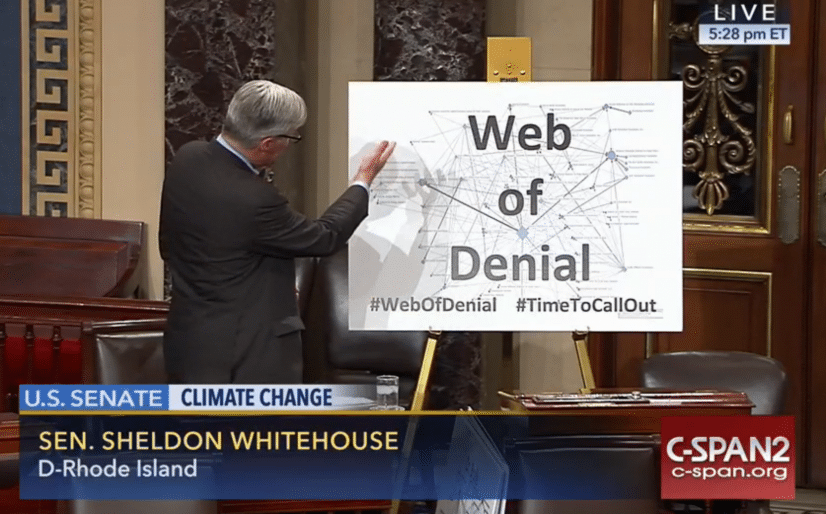In the 1990s, personnel from the Competitive Enterprise Institute (CEI) were flying across oceans to stoke climate science denial.
In 1995, in what is thought to be the first conference promoting climate science denial in Britain, the CEI’s then president Fred Smith joined another US guest from the Atlas Economic Research Foundation for a series of talks that undermined warnings about the impacts of fossil fuels on the climate.
Now more than 20 years on, Democratic Senators from across the pond have completed a blitz of speeches describing the fossil fuel funded “web of denial” – with organisations including the CEI featuring heavily in their forensic analysis.
This “web of denial” has held back action to cut greenhouse gas emissions while confusing the public on climate change.
UK Links to Web of Denial
But the 1995 conference, held in the plush surroundings of the London St Ermin’s Hotel, is just one example of the long-standing links between the US “web of denial” and Britain.
Because while no less than 19 Senators blasted the funders, organisers and actors in the web of denial, the impact of that fossil fuel funded propaganda has gone far beyond the US border, stretching across the Atlantic to Britain and over the Pacific to Australia.
In the same way, the multi-million dollar investments in the web of denial by the likes of coal giant Peabody Energy, oil major ExxonMobil and the oil billionaire Koch brothers had a global reach.
The 1995 conference was opened by John Blundell, the boss of the “free market think tank” the Institute of Economic Affairs (IEA).
At the conference, the US-based Dr Patrick Michaels gave a talk with a telling title: “Are claims of man-made climate change exaggerated, or are the risks as significant as predicted? Is there really scientific consensus on global warming?”
Michaels went on to work for the Cato Institute – another fossil fueled and Koch-linked outfit that has tried to convince the public that human-caused climate change is a non-issue.
Institute of Economic Affairs
The IEA continues its ties to this US network today. The institute’s “energy and climate fellow” is Robert L. Bradley – the founder of the Texas-based Institute for Energy research who also has links to the CEI and Cato Institute as a former fellow.
The group has also pulled in more than half a million dollars from its “American Friends of the Institute of Economic Affairs” fundraising arm.
The Global Warming Policy Foundation (GWPF) – the UK’s most prominent group promoting climate science denial founded by Lord Nigel Lawson and with ties to the IEA – has also forged links with organisations cited by the US Senators.
The GWPF’s academic advisory council includes the likes of Cato Institute fellows Deepak Lal and Richard Lindzen, Heartland Institute beneficiary Indur Goklany and Princeton professor William Happer, who is a director of the CO2 Coalition.
Internal papers from the Heartland Institute showed that in 2012 Goklany was to be paid $1000 per month for work on the institute’s Nongovernmental Panel on Climate Change reports.
Happer was caught in a Greenpeace sting last year when he offered to write a report for a fake oil lobbyists, suggesting the payment be funneled through the CO2 Coalition.
The GWPF’s most recent annual lecture was delivered by Patrick Moore, another CO2 Coalition director. Moore recently delivered a talk hosted and paid for by Europe’s umbrella lobby group for the coal industry.
Moore encouraged attendees to “celebrate” CO2.
GWPF funder David Herro also neatly ties GWPF to the US web of denial. Financial analyst Herro, a Republican donor, has also donated to the Heartland Institute and the Cato Institute.
Heartland is the US “think tank” that once used a giant billboard to compare people who accepted human-caused climate change to terrorist and murderer Ted “Unabomber” Kaczynski.
UK Personnel to Web of Denial
But the UK has also provided personnel to the US web of denial.
Roger Bate and Julian Morris – both “honorary fellows” at the IEA – have long worked in organisations pushing doubt over the causes and consequences of climate change.
Morris works at the Reason Foundation and Bate, a founder of the IEA’s environment unit, is at the American Enterprise Institute.
And then of course, there is the US-based Science and Public Policy Institute’s chief policy advisor – British hereditary peer Lord Christopher Monckton – the self-styled “high priest of climate scepticism”.
Monckton has spoken at Heartland Institute climate conferences, travelled to UN meetings with the Committee for a Constructive Tomorrow and joined other denialists in the Vatican to challenge the Pope’s forthright stance on cutting greenhouse gas emissions.
During this week’s Senate speeches, Monckton came in for harsh criticism from Senator Elizabeth Warren, of Massachusetts.
Senator Warren told the senate that Monckton had been invited by Republicans to give evidence to congress on three occasions.
“So let’s ask ourselves the question here. Who is Christopher Monckton.. oooh… oh boy,” exclaimed Warren.
Warren continued: “The fact is, Monckton is not a climate scientist or a scientist of any kind. His degrees are in classics and journalism. Actual scientists who have taken a look at his work have found his conclusion to be completely made up.
“So why does it matter that scientific posers like Christopher Monckton and industry-funded hacks like Willie Soon are running around saying crazy things about climate change?
“Well, I will tell you why it matters. It matters because by attaching themselves to the Science and Public Policy Institute and other credible-sounding think tanks, people start to take them seriously.”
The speeches delivered in the US Senate took hours to deliver. They pieced together the web of denial, its funders and the field of academic research that has sprung up to study it.
The UK has been both a provider and a victim of that web of denial.
Subscribe to our newsletter
Stay up to date with DeSmog news and alerts







